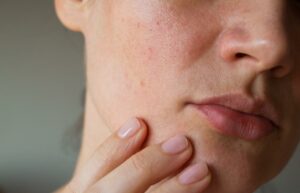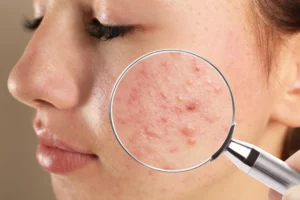Dealing with Polycystic Ovary Syndrome (PCOS) is more than just managing hormonal imbalances and reproductive issues. Rather, it’s also about navigating the challenging skin problems that often accompany this condition. From acne breakouts to excessive hair growth, the impact of PCOS on skin health can be profound and distressing. However, the right skincare regime can make a significant difference. In this guide, we delve into the best skin care for PCOS tailored specifically for those battling with PCOS.
Contents
Importance Of Best Skin For PCOS
 Maintaining healthy skin is crucial for individuals with PCOS, a hormonal disorder that often affects the skin in various ways. The importance of best skin care for PCOS encompasses several key aspects:
Maintaining healthy skin is crucial for individuals with PCOS, a hormonal disorder that often affects the skin in various ways. The importance of best skin care for PCOS encompasses several key aspects:
- Managing Acne and Breakouts: PCOS often leads to hormonal imbalances that can cause severe acne. Proper skincare helps manage these breakouts. And, reducing inflammation and preventing scarring.
- Controlling Excess Oil Production: Hormonal fluctuations in PCOS can lead to increased sebum production. And, resulting in oily skin. A tailored skincare routine can help control oiliness and reduce the likelihood of acne and other skin issues.
- Reducing Hirsutism Symptoms: PCOS can cause excessive hair growth on the face and body (hirsutism). Effective skincare routines, including gentle hair removal methods and products that minimize irritation, are important for managing this symptom.
- Improving Skin Texture and Tone: PCOS can lead to skin issues like hyperpigmentation and rough texture. Skincare products that target these issues can help improve the overall appearance and health of the skin.
- Boosting Self-Esteem and Confidence: Skin problems associated with PCOS can affect self-esteem and mental well-being. By improving skin health, individuals can feel more confident and comfortable in their skin, positively impacting mental health.
- Preventing Long-Term Skin Damage: Without proper care, the skin issues associated with PCOS can lead to long-term damage, including scarring and premature aging. A good skincare regimen helps in preventing these long-term effects.
- Holistic Health Approach: Taking care of the skin is part of a holistic approach to managing PCOS. It often goes hand in hand with other health management strategies like a balanced diet, regular exercise, and stress reduction.
Overall, the best skin care for PCOS is not just about improving skin appearance; it’s a vital part of managing the condition, improving overall health, and enhancing quality of life.
Best Skin Care For PCOS Strategies
Managing skin care effectively for those with Polycystic Ovary Syndrome (PCOS) requires a combination of targeted treatments, lifestyle adjustments, and sometimes medical interventions. Here are some of the best skin care for PCOS:
Gentle Cleansing
Those with PCOS need to use a gentle cleanser that effectively removes dirt, oil, and makeup without stripping the skin of its natural oils. Harsh cleansers can disrupt the skin’s natural barrier, leading to increased oil production, irritation, and acne. A good cleanser should be pH-balanced and free from harsh surfactants like sodium lauryl sulfate. Cleansing twice a day, morning and night, helps to keep the pores clear and reduce the likelihood of acne flare-ups.
Regular Exfoliation
Exfoliating with a gentle scrub or a chemical exfoliant like alpha-hydroxy acids (AHAs) or beta-hydroxy acids (BHAs) can be very beneficial. These exfoliants help in removing dead skin cells that clog pores and lead to acne. For PCOS-related skin, which is often more prone to acne, BHAs like salicylic acid are particularly effective as they can penetrate oil to exfoliate inside the pore. However, over-exfoliation can damage the skin barrier. So it’s important to limit this to a few times a week and observe how your skin reacts.
Oil Control
Managing excess oil is a common challenge for those with PCOS. Look for skincare products labeled as ‘oil-free’ and ‘non-comedogenic’. Ingredients like niacinamide are beneficial for regulating oil production. Additionally, using a clay mask once or twice a week can help absorb excess oil. Be careful not to over-dry the skin, as this can trigger more oil production in response.
Acne Management
 Topical treatments containing active ingredients like benzoyl peroxide, salicylic acid, or retinoids can be effective in treating PCOS-related acne. Benzoyl peroxide is great for killing acne-causing bacteria, salicylic acid helps unclog pores, and retinoids promote cell turnover and prevent the formation of new acne. It’s important to start with a lower concentration to assess skin tolerance and gradually increase as needed.
Topical treatments containing active ingredients like benzoyl peroxide, salicylic acid, or retinoids can be effective in treating PCOS-related acne. Benzoyl peroxide is great for killing acne-causing bacteria, salicylic acid helps unclog pores, and retinoids promote cell turnover and prevent the formation of new acne. It’s important to start with a lower concentration to assess skin tolerance and gradually increase as needed.
Moisturize Wisely
Moisturizing is vital even for oily, acne-prone skin. Skipping this step can lead to dehydrated skin, which may produce more oil to compensate. Opt for lightweight, gel-based moisturizers that hydrate without feeling heavy or greasy. Look for ingredients like hyaluronic acid that provide hydration without clogging pores.
Sun Protection
Daily sunscreen use is crucial, especially for those using acne treatments, which can make skin more sensitive to the sun. A broad-spectrum sunscreen with at least SPF 30 is recommended. Physical sunscreens containing zinc oxide or titanium dioxide are often well-tolerated by sensitive and acne-prone skin types.
Hirsutism Management
Hirsutism, or excessive hair growth, is a common issue for women with PCOS. Managing this involves various hair removal methods like shaving, waxing, plucking, or using depilatory creams. However, these methods can sometimes irritate the skin, so it’s important to use soothing, anti-inflammatory skincare products afterward. For a more long-term solution, treatments like laser hair removal or electrolysis can be considered. Some women also benefit from prescription creams that slow hair growth.
Healthy Diet
 Diet plays a crucial role in managing PCOS. A diet high in whole foods like fruits, vegetables, lean proteins, and whole grains can help regulate hormones and reduce inflammation, which in turn can improve skin health. Reducing the intake of processed foods, refined sugars, and high-glycemic carbohydrates is also beneficial as these can exacerbate acne and other skin problems. Additionally, some women with PCOS find that dairy products worsen their acne, so experimenting with a dairy-free diet may be helpful.
Diet plays a crucial role in managing PCOS. A diet high in whole foods like fruits, vegetables, lean proteins, and whole grains can help regulate hormones and reduce inflammation, which in turn can improve skin health. Reducing the intake of processed foods, refined sugars, and high-glycemic carbohydrates is also beneficial as these can exacerbate acne and other skin problems. Additionally, some women with PCOS find that dairy products worsen their acne, so experimenting with a dairy-free diet may be helpful.
Stay Hydrated
Keeping the body well-hydrated is essential for overall health and can also benefit the skin. Adequate water intake helps to flush out toxins, supports skin hydration, and maintains skin elasticity. While the amount of water needed can vary, aiming for at least eight glasses a day is a good rule of thumb.
Regular Exercise
Regular physical activity can help manage PCOS symptoms by improving insulin sensitivity, reducing stress, and promoting overall well-being. Exercise can also help regulate hormones and reduce the severity of acne and other skin issues. Whether it’s cardio, strength training, yoga, or simply walking, finding an exercise routine you enjoy and can stick with is key.
Stress Management
Stress can exacerbate PCOS symptoms, including skin issues. So, stress management techniques such as yoga, meditation, deep breathing exercises, and mindfulness can help reduce stress levels. Getting enough sleep and engaging in activities you enjoy is also important for managing stress.
Hormonal Treatments
For some women with PCOS, hormonal treatments like birth control pills, anti-androgens (such as spironolactone), or metformin can help manage symptoms, including skin issues. These treatments work by regulating hormones, which can reduce acne, decrease hair growth, and improve overall skin health. It’s important to discuss these options with a healthcare provider to understand the potential benefits and side effects.
Each of these strategies contributes to a comprehensive approach to managing PCOS and its skin-related symptoms. It’s often a combination of these measures, rather than a single solution, that yields the best results. As always, individual experiences may vary. Hence, it’s important to tailor these strategies to your specific needs and consult with healthcare professionals as needed.
What Skincare Ingredients To Avoid With PCOS?
 When managing PCOS and its associated skin concerns, it’s crucial to be aware of certain skincare ingredients that might exacerbate skin issues. Here are some ingredients typically recommended to avoid or use with caution:
When managing PCOS and its associated skin concerns, it’s crucial to be aware of certain skincare ingredients that might exacerbate skin issues. Here are some ingredients typically recommended to avoid or use with caution:
- Harsh Exfoliants: Strong exfoliating agents like high concentrations of glycolic acid or physical scrubs with rough particles can irritate the skin, leading to increased redness and sensitivity. Over-exfoliation can also disrupt the skin barrier, making skin issues worse.
- Alcohol-Based Products: Alcohol, particularly denatured alcohol (SD alcohol or alcohol denat.), can be overly drying and irritating for the skin. This can lead to an overproduction of oil as the skin tries to compensate for the dryness, potentially worsening acne and other skin issues.
- Artificial Fragrances and Dyes: Synthetic fragrances and dyes are common irritants that can trigger allergic reactions, skin sensitivity, and inflammation. They offer no benefits to the skin and are best avoided, especially for those with sensitive or acne-prone skin.
- Sulfates: Ingredients like sodium lauryl sulfate (SLS) and sodium laureth sulfate (SLES) are harsh detergents found in many cleansers. They can strip the skin of its natural oils, leading to dryness, and irritation, and potentially causing an increase in oil production.
- Parabens: While the research on parabens is mixed, some people choose to avoid these preservatives due to potential skin irritation and other health concerns.
- Chemical Sunscreens: Chemical sunscreen ingredients like oxybenzone and avobenzone can be irritating to sensitive skin. Mineral sunscreens with zinc oxide or titanium dioxide are often recommended as gentler alternatives.
- Formaldehyde and Formaldehyde-Releasing Preservatives: These can be irritating and allergenic to the skin, and are best avoided, particularly by those with sensitive or reactive skin types.
It’s important to remember that everyone’s skin is different, and ingredients that cause issues for one person may not be for another. Patch-testing new products and monitoring your skin’s reaction is always a good practice.
Conclusion
In conclusion, managing skin care for PCOS requires a thoughtful and tailored approach. From choosing gentle cleansing routines and avoiding harsh ingredients to implementing a balanced diet and stress management techniques, each aspect plays a crucial role. Remember, the journey to better skin health with PCOS is personal and may require some trial and error. Patience, consistency, and being in tune with your body’s unique needs are key.
Most importantly, don’t hesitate to seek advice from healthcare professionals for personalized guidance. If you are facing PCOS-related issues, PCOS treatment at HerMantra can help. Book your free trial online pcos treatment session now.


